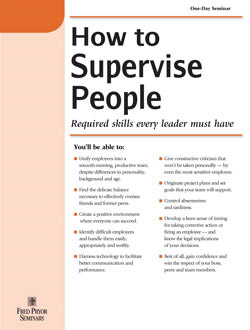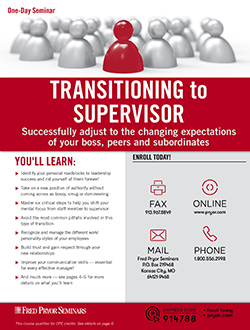Why is Management and Leadership Training Important?
Bad supervisors cost companies more than $500 billion each year in losses ranging from lack of productivity and engagement to high employee turnover and damaging decision-making. Ensure your leaders have the training to manage and engage onsite and virtual teams with award-winning supervisory, leadership and management training.
Whether you’re becoming a first-time manager, you’re transitioning to a new supervisory position or you’re dealing with bad attitudes and negative behaviors, understanding the principles of effective leadership and management skills creates leaders who engage and retain productive and happy teams.
Who Can Benefit From the Pryor Management Training Programs?
HR professionals aiming to elevate their management teams will find our supervisor training seminars and webinars invaluable. High turnover rates in your organization could stem from a lack of leadership training, leading to low morale, poor performance and a weak work culture. Whether you’re preparing first-time managers or refining the skills of seasoned leaders, our training courses cater to a wide range of needs.
Individual managers and supervisors will also find our management training courses beneficial. If you’re seeking to enhance your management skills and advance your career, mastering new leadership techniques is essential. With over 100 seminars and webinars available, you’ll easily discover the specific skill set you need to develop.
What Leadership Skills Will You Learn?
Each training course is designed to teach specific, actionable skills. Our most popular management seminars and webinars focus on:
- Transforming supervisors into effective leaders and coaches
- Techniques for motivating employees
- Conflict resolution training
- Invaluable lessons for new managers
- The most effective management and leadership styles to improve morale and productivity
- Laws and regulations for supervisors
Why Train with PRYOR?
- Over 50 years in the learning and development industry
- Award-winning training for individuals and teams
- Learn online anywhere, anytime or at in-person events
- Professional credits and certifications
Types of Supervisor, Management & Leadership Training
- Live virtual seminars
- In-person events
- Live and on-demand webinars
- Downloadable products
- A component of your PryorPlus annual pass












